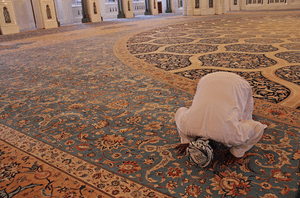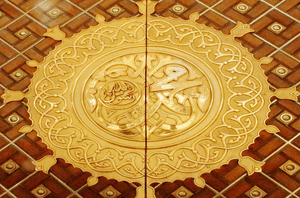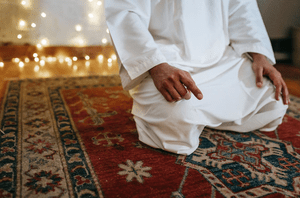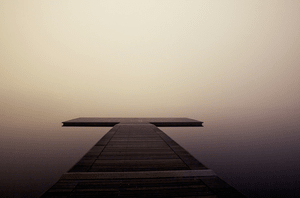Before praying ṣalāh, always try your best to remove distractions. Anything which may distract or worry you in ṣalāh will reduce the khushūʿ in your ṣalāh.
Ibn Kathīr (raḥimahullāh) says, “Khushūʿ in ṣalāh is only attained by the one who has emptied his heart totally for it, who occupies himself fully for it and does not pay attention to anything else besides it, and who prioritises it over everything else. At that point it becomes a source of comfort and intense joy.”
So if you are hungry, eat before you pray. Similarly, if you need to relieve yourself, do it before you pray. The Messenger of Allah ﷺ said, “Ṣalāh should not be performed when the food has been presented, nor when one is fighting the urge to go to the bathroom” (Abū Dāwūd). He ﷺ also said, “If dinner is served, and the iqāmah for ṣalāh has been given, then start with the dinner” (Bukhārī).
Imām al-Munāwī (raḥimahullāh) explains that the above narrations indicate that it is more important and virtuous to pray with the presence of the heart, than to pray at the start of the prayer time.
“An insightful person attends to what he needs to before ṣalāh so that he may enter the ṣalāh with his heart unburdened.” – Abū al-Dardā’ (raḍiy Allāhu ‘anhu)
How to eliminate distractions
• Find a quiet place to pray. Avoid praying where others are talking or where there is a noise that is likely to distract you.
• Mentally go ‘offline’ for your ṣalāh by ensuring your phone is on ‘silent mode’. Avoid checking your phone between the farḍ and sunnah prayers.
• If you have a small child, where possible, ask someone to look after them whilst you pray.
• Avoid performing your ṣalāh whilst you have urgent matters waiting. For instance, if you are cooking, then turn off the cooker for the duration of the ṣalāh to stop you worrying about it during your ṣalāh.
• Pray where you are comfortable. Avoid anywhere where it is too cold or too hot, as this might hinder your ability to focus.
• Pray in clothes which are not distracting. The Prophet ﷺ once returned a garment which had patterns on it to one of his Companions (radiy Allāhū ‘anhum) because it distracted him during his ṣalāh (Bukhārī).
• Ensure you are not surrounded by distracting objects. The Prophet ﷺ told his wife ʿĀ’ishah (raḍiy Allāhu ‘anhā) to remove a curtain because its pictures had diverted his attention in ṣalāh (Bukhārī).
• Pray towards a sutrah (a barrier or a wall in front of you). The Messenger of Allah ﷺ said, “When one of you prays towards a sutrah he should stay close to it and not let Shayṭān interrupt his ṣalāh” (Abū Dāwūd). The wisdom behind using a sutrah is to prevent your eyes glancing further than the sutrah and, therefore, beyond your place of prayer. It also stops people from passing in front of you, and stops ṣhayṭān from passing by and ruining your prayer.
Occasionally, during ṣalāh, we may find ourselves distracted due to thinking about petty matters. On such occasions, we should try to remember the greatness of the One we are conversing with and the majesty of the One looking at us. We should think about death and the hereafter, and rein in our thoughts to bring our minds back to ṣalāh.
Once a fire broke out in the house of ʿAlī b. al-Ḥusayn (raḍiy Allāhu ‘anhu), whilst he was prostrating. People around him began to say, “O son of the Messenger of Allah! Fire! Fire!” However, he did not raise his head until the fire was extinguished. When this was mentioned to him, he remarked, “The other Fire (i.e. Hell-fire) distracted me from it.”
Learn the fiqh of ṣalāh
Learn and regularly refresh your knowledge of the legal rulings of ṣalāh, so that you are not distracted by thoughts like, ‘Is my ṣalāh valid/should I be repeating the prayer, or is sajdah al-sahw sufficient?’ This will help you to pray ṣalāh more calmly and with greater khushūʿ.





